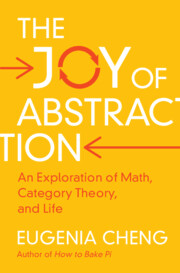Book contents
- Frontmatter
- Dedication
- Contents
- Prologue
- Part One Building up to Categories
- Interlude A Tour of Math
- Part Two Doing Category Theory
- 14 Isomorphisms
- 15 Monics and epics
- 16 Universal properties
- 17 Duality
- 18 Products and coproducts
- 19 Pullbacks and pushouts
- 20 Functors
- 21 Categories of categories
- 22 Natural transformations
- 23 Yoneda
- 24 Higher dimensions
- Epilogue Thinking categorically
- Appendices
- Glossary
- Further Reading
- Acknowledgements
- Index
15 - Monics and epics
from Part Two - Doing Category Theory
Published online by Cambridge University Press: 13 October 2022
- Frontmatter
- Dedication
- Contents
- Prologue
- Part One Building up to Categories
- Interlude A Tour of Math
- Part Two Doing Category Theory
- 14 Isomorphisms
- 15 Monics and epics
- 16 Universal properties
- 17 Duality
- 18 Products and coproducts
- 19 Pullbacks and pushouts
- 20 Functors
- 21 Categories of categories
- 22 Natural transformations
- 23 Yoneda
- 24 Higher dimensions
- Epilogue Thinking categorically
- Appendices
- Glossary
- Further Reading
- Acknowledgements
- Index
Summary
Another example of doing things categorically, that is, moving away from elements and expressing structure in terms of morphisms in a category. We examine the asymmetry in the definition of a function, leading to the definitions of injective and surjective functions. We examine examples and non-examples from life, which include people stepping on your foot, and people experiencing homelessness; mathematical examples and non-examples include functions from the integers to the integers that add 1 or multiply by 2, and also the empty function. We define monics and epics as categorical versions of injective and surjective functions, and show that in Set they actually correspond to injections and surjections. We show that isomorphisms are necessarily monic and epic, but that a monic and epic morphism is not necessarily an isomorphism in other categories. We examine this in the category of monoids. We conclude by mentioning some further topics: density, the use of monics to define subobjects, and the issues of generalizing monics and epics to higher dimensions.
- Type
- Chapter
- Information
- The Joy of AbstractionAn Exploration of Math, Category Theory, and Life, pp. 186 - 205Publisher: Cambridge University PressPrint publication year: 2022



